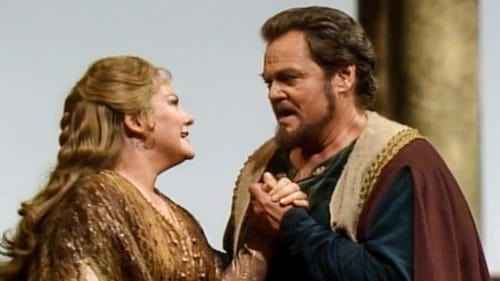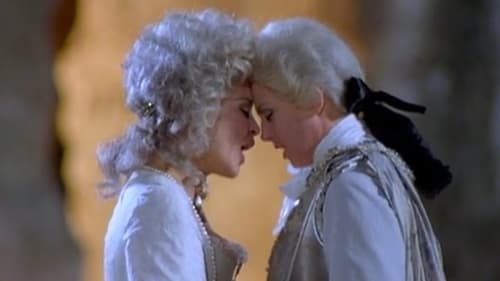Tatiana Troyanos
Nacimiento : 1938-09-12, New York City, New York, USA
Muerte : 1993-08-21

Giulietta
Otto Schenk’s brilliant production captures both the dark romanticism of the story as well as its fairy-tale magic. It is a superb setting for Neil Shicoff’s vivid portrayal of the tortured poet Hoffmann, as he recounts the loves of his life and the way he has been foiled by his nemesis—a marvelous James Morris in a tour-de-force performance of the opera’s four villains. Gwendolyn Bradley is the doll Olympia, Tatiana Troyanos sings the courtesan Giulietta, and Roberta Alexander portrays the innocent Antonia.

Composer
Jessye Norman is a regal Ariadne, the mythological Greek heroine in this opera-within-an-opera, opposite the passionate Bacchus of the great James King. Kathleen Battle delivers the coloratura fireworks of Zerbinetta, the leader of a commedia dell’arte troupe that finds itself stranded on Ariadne’s island. Tatiana Troyanos and Franz Ferdinand Nentwig star as the young Composer and the Music Master in the opera’s prologue. James Levine brings out all the color and charm of Strauss’s brilliant chamber-sized score with its equal amounts of pathos and humor. Bodo Igesz’s production features sets by esteemed designer Oliver Messel.

Prince Orlofsky
Live performance from the Metropolitan Opera, 31 December 1986.

Anita
A documentary which shows, in great detail, the making of the 1985 Bernstein-conducted recording of the entire score of "West Side Story", featuring operatic stars.

Dido
Berlioz’s colossal masterpiece requires stupendous forces—dozens of soloists, enormous chorus, orchestra and ballet, a superb conductor who understands the uniqueness of the score—plus a production that does visual justice to the work. “A stupendous achievement” was one critic’s assessment of Peter Wexler’s inventive production. And with James Levine’s wizardry galvanizing the marvelous all-star cast, this is truly a gem. Plácido Domingo is the legendary hero Aeneas, Jessye Norman the obsessed prophetess Cassandra, and Tatiana Troyanos is Queen Dido, who commits suicide when Aeneas leaves her.

Mezzo soprano
In Concert at the Met (DVD) - Highlights Five of the Met's greatest stars - Price, Horne, Troyanos, Domingo, and Milnes - joined James Levine for a series of irresistible concert programs, originally telecast in the 1980s. Featuring works by composers ranging from Handel to Meyerbeer to Puccini and Verdi, these performances include some of opera's favorite moments, delivered by a stunning group of legendary artists. Plàcido Domingo, Tatiana Troyanos (February 28, 1982) Leontyne Price, Marilyn Horne (March 28, 1982) Plàcido Domingo, Sherrill Milnes (January 30, 1983)

Venus
As renowned for its harmonious overture as for its romantic storybook characters, this three-act masterwork features some of the composer’s most groundbreaking and unforgettable music, as well as a theme the young Wagner would revisit again and again later in his career—the redemptive and transcendent power of a woman’s love. The enchanting plot harks back to medieval history: Wolfram is a lovesick troubadour who desires the virtuous Elisabeth. She, however, has eyes for another: the rebellious knight Tannhäuser, who in turn cannot get over an overwhelming sensual experience in the realm of the goddess Venus, and is banished for singing her praises at court. Only saintly Elisabeth’s death can atone for his misdeeds.

In this stunning performance from 1982, Strauss’s enchanting fairy tale for adults is blessed with a cast, conductor, and production that have made it legendary—complete with superstar Luciano Pavarotti in the cameo role of the Italian Singer. Gorgeous Kiri Te Kanawa is the Marschallin, the gracious noblewoman who understands that her affair with a younger man cannot last. Tatiana Troyanos is every bit the passionate seventeen year old Octavian who swears he will never love another woman—until he meets the bewitching Sophie (Judith Blegen) when he presents her with a silver rose on behalf of the loutish Baron Ochs (Kurt Moll). James Levine’s inspired leading of the Met orchestra and the enthralling production by Nathaniel Merrill and Robert O’Hearn combine to bring Old Vienna, with its timeless elegance, to life once again.

Princess Eboli
Don Carlo (1980) Metropolitan Opera. Verdi / italian. King Philip's court is plagued by rebels, family squabbles and intrigue. The Spanish Inquisition tries to exert its influence. The tension finally ignites at the King's coronation, where heretics are to be burned at the stake

Sesto
"La Clemenza di Tito" was Mozart's last stage work. It was commissioned for an Imperial coronation ceremony while Mozart was at work on "Die Zauberflöte" and was composed in great haste. Indeed, time was so short that composition of the secco recitatives was assigned to Mozart's pupil Süssmayr. As in the earlier "Idomeneo", Mozart sought to produce an opera seria that was dramatically viable. He enlisted the poet Mazzolà to substantially revise the Metastasio libretto, which had already been set some fifty times. The number of arias was reduced from 25 to 11, and ensembles and choruses were added to enliven the proceedings. Though perhaps not the very top-drawer Mozart, the music is wonderful.

Santuzza
Plácido Domingo accomplishes the rare feat of singing both leads on the same night at the Met in 1978 on opera's most popular double-bill.

Jeanne - the prioress of St. Ursula's Convent
This opera revolves around the demonic collective possession suffered by the Ursuline nuns in the convent of Loudun in 1634. The story concentrates on the handsome but doomed Urbain Grandier who fights against fanaticism and evil.









